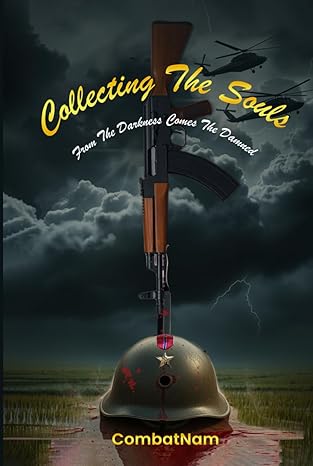Explore More
How Veteran Authors Are Redefining Male Literature Through Raw Combat Truth
Veteran authors redefine masculinity through raw trauma fiction, offering male readers authentic insight into mental health, healing and emotional strength

Men are picking up books that tell hard truths about war, trauma and what happens when the shooting stops. This isn’t the sanitised heroism of Hollywood blockbusters or the neat resolution of afternoon television dramas. It’s raw, unfiltered examination of what combat does to the human psyche, written by people who’ve been there.
The numbers paint a stark picture. Veterans die by suicide at twice the rate of civilians – roughly 34 per 100,000 compared to 17 per 100,000 for the general population. For Vietnam veterans specifically, estimates suggest 94,500 have taken their own lives over four decades. These aren’t statistics that make comfortable reading, but they represent a crisis that fiction is uniquely positioned to address.
When Literature Becomes Lifeline
Enter authors like CombatNam, the pen name for SPC Clifford E. Blake, a Bronze Star-decorated Vietnam veteran whose second book ‘From the Darkness, Comes the Damned’ continues his Collecting The Souls trilogy. Blake represents a growing movement of veteran authors who refuse to sanitise their experiences for mass consumption. ‘This trilogy is more than fiction, it is a soul-stirring reckoning written by a soldier who lived the conflict, endured the silence, and emerged with a voice too powerful to ignore,’
His protagonist isn’t the poster-boy patriot of recruitment advertisements but a man ‘weathered by time and trauma’ who must navigate ‘not only the memories of battlefield violence, but the cold neglect of a society that chose amnesia over accountability.’
This approach resonates because it acknowledges what researchers have long understood: traditional therapy doesn’t work for everyone. The Veterans Writing Project, founded by veterans for veterans, recognises that storytelling serves a dual purpose – it helps writers process their experiences while providing readers with authentic representation of military trauma.
The Male Reading Renaissance
Publishing trends suggest men are increasingly drawn to authentic narratives over escapist entertainment. While women dominate fiction bestseller lists – making up two-thirds of authors featured on Sunday Times fiction charts this year – male readers are seeking specific content that addresses their experiences and challenges.
The rise of genre-blending fiction, particularly psychological thrillers and speculative fiction that explores trauma, reflects this demand. Books that combine action with introspection, supernatural elements with psychological realism, offer male readers both entertainment and genuine insight into complex emotional territory.
Blake’s work fits this mould perfectly. His protagonist’s encounters with ‘the Bright Light’ – a supernatural presence that blurs ‘the lines between salvation and damnation’ – provides metaphorical framework for examining moral conflict and spiritual awakening that many veterans experience.
Beyond Entertainment: Books as Tools
What sets veteran-authored trauma fiction apart is its practical application. Research shows that participating in storytelling activities increases mental wellbeing statements by 450% compared to discussing the same experiences in conventional therapy settings. For readers, exposure to authentic veteran narratives builds understanding and empathy that can translate into real-world support.
Blake’s background reinforces this authenticity. Raised in Chicago’s tough neighbourhoods, he earned his GED in the Army before serving with distinction in Vietnam’s armoured units. Post-service, he worked as chef, truck driver, Department of Defence police officer and studied theology and martial arts. This breadth of experience informs writing that doesn’t shy away from complexity or contradiction.
‘His characters, driven by a raw sense of betrayal and a longing for justice, become avatars for thousands of veterans living in silence,’ the description of his work notes. This representation matters because it validates experiences that might otherwise remain isolated and shameful. Military veterans continue finding healing through literary expression, transforming personal trauma into powerful narratives that serve broader communities.
The Business of Authentic Voices
Publishing houses are taking notice. Independent presses focusing on male authors are emerging, recognising that ‘ambitious, funny, political and cerebral fiction by men’ often gets overlooked in today’s market. This creates opportunities for authors who write outside mainstream commercial categories.
For veteran authors specifically, the market is expanding. With 80th anniversaries of World War II’s end approaching in 2025, demand for military stories is increasing across multiple platforms – from traditional publishing to podcasts to genealogy societies seeking authentic narratives.
Blake’s trilogy approach – with ‘The Passing’ already available, ‘From the Darkness, Comes the Damned’ releasing soon, and a third volume planned – demonstrates smart market positioning. Serial storytelling builds reader investment while providing multiple revenue streams.
Writing Through the Wound
The therapeutic value of trauma fiction extends beyond individual healing. Research suggests that 98% of combatants manifest war neuroses after five weeks of sustained combat, yet society often lacks language to discuss these experiences meaningfully. Fiction bridges this gap by creating shared vocabulary and reference points.
Blake’s work addresses this directly. His protagonist struggles with ‘the cold neglect of a society that chose amnesia over accountability’ – a sentiment that resonates with many veterans who feel forgotten by civilian culture. By dramatising these internal conflicts through supernatural elements and action sequences, the narrative makes abstract psychological concepts tangible and discussable.
The trilogy’s progression from ‘The Passing’ through ‘From the Darkness, Comes the Damned’ to the final unnamed volume mirrors the therapeutic journey many veterans experience – acknowledgment, confrontation and eventual integration of traumatic experiences. As demonstrated by the growing demand for hard-edged performance literature, readers increasingly seek narratives that don’t flinch from difficult truths about betrayal and self-perception.
The Broader Impact
Veteran trauma fiction serves society beyond entertainment value. As mental health awareness increases and suicide prevention becomes urgent priority, authentic narratives help civilians understand what military service actually costs. This understanding can translate into better support systems, more informed policy decisions and reduced stigma around seeking help.
For male readers specifically, these books offer permission to explore emotional territory often considered off-limits. Traditional masculinity scripts don’t provide tools for processing trauma, betrayal or moral injury. Fiction creates safe space to examine these experiences without direct vulnerability.
Blake’s work offers this approach. His protagonist isn’t weakness masquerading as strength but genuine strength acknowledging genuine wounds. This representation offers alternative models of masculinity that incorporate both toughness and emotional intelligence. The broader context shows that authors must navigate an increasingly crowded publishing market where authentic voices can still cut through the noise.
The publishing industry’s growing recognition of these narratives suggests cultural change toward valuing authentic experience over manufactured drama. For authors willing to write with unflinching honesty about difficult subjects, opportunities are expanding. For readers seeking substance over spectacle, the supply of meaningful content is finally catching up with demand.





